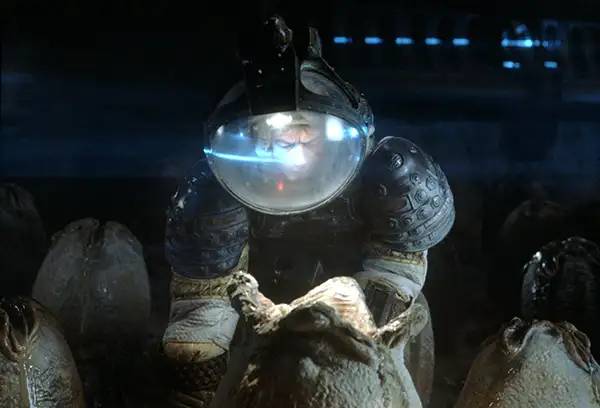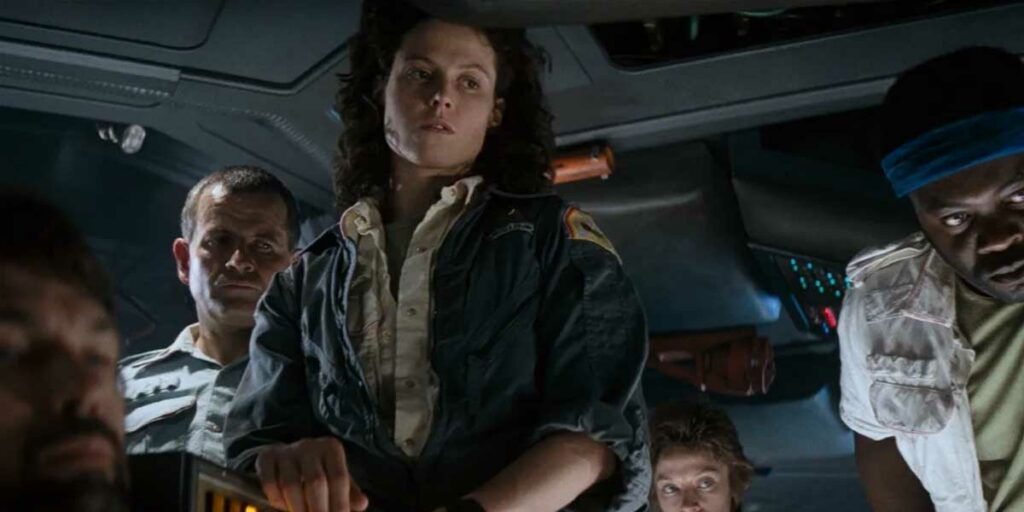Ridley Scott’s Alien is a revolutionary sci-fi horror that shines thanks to its dark subtexts of corporate greed and capitalist inhumanity.
This analysis contains spoilers for Alien (1979)
“Bring back life form. Priority One. All other priorities rescinded”
Alien might begin as a pretty simple creature feature with advanced practical effects and jumpscares, but the film quickly transforms into a much darker, grittier takedown of capitalist society when Ash (Ian Holm) reveals his true identity and secret orders in the story’s emotional climax. The film begins with the crew of the Nostromo spaceship diverting their course and bringing an alien species on board, but when the creature proves much deadlier than anybody was expecting, leader Ripley (Sigourney Weaver) and her friends are left fighting for their lives. However, when undercover synthetic Ash drops the bombshell that the alien was “Priority One” all along (and the survival of the crew was merely secondary) Alien’s true purpose as a subtextual criticism of the American corporate lifestyle becomes clear – it’s not just the advanced effects that make Scott’s alien terrifying, but rather its uncanny resemblance to ourselves.
The grim reality of corporate greed is something that bleeds throughout Ridley Scott’s entire filmography, with both the Replicants in Blade Runner and more recently the scientists in The Martian embodying some kind of selfish, dangerous obsession with advancement that sparks the main conflict in these stories. Alien is exactly the same, even if it’s hidden behind the facade of a much simpler narrative. Though the extent of the Weyland-Yutani Corporation’s greed and criminality isn’t given away until that shocking reveal with Ash, Scott’s unique color palette and directorial style immediately draw attention to the bleak and hopeless nature of this story. From the beginning, every scene is haunted with a slight blue/grey tint that removes much of the color (and consequently, emotion) from these moments.
This decision is often read as Scott’s attempt to have the spirit of the soulless corporate machine present throughout the movie, even when it’s not directly involved in the story, and that’s backed up through his use of monochrome and shadows in the final act. Everything feels slightly void of life, and that’s Alien’s first indicator that there’s a complete absence of personality and soul to the faces behind the curtain – immediately framing Weyland-Yutani as the real villains before audiences even understand why. It’s not until the true intentions of the corporation (to prioritise science over humanity) are revealed that audiences are given an actual reason to root against them, but by this point, Scott has already manipulated us into distrusting them.
Alien is filled with allegories: almost every single character can be read in different ways, and there are countless theories floating around regarding what the film actually means. Some will claim that Alien is a warning against human evolution, a love letter to the human spirit, or even a commentary on the nature of film itself, but one thing that’s unavoidable in this story is Scott’s clear hatred for the way these characters are treated by the society they’re supposed to trust. The character of Ash really gives this away – not only do his direct orders to betray his crewmates prove that Weyland-Yutani values the potential of an alien species over several human lives, but the fact that he’s disguised as a human also frames him as an allegory for the way capitalist propaganda is often hiding in plain sight.

As the audience, we immediately trust Ash because of his harmless appearance and apparent desire to help the other people around him – which makes his betrayal even more shocking. Scott knows that he can’t just create a deadly monster and let the audience figure out the subtext. Instead, he pairs this grotesque creature with something apparently trustworthy in Ash to show how appearances can often be deceiving and society’s real problems are hidden in the shadows. It’s a genius way of making the audience question what they know about reality, forcing them to question which figures in the world (celebrities, politicians, corporations) have hidden agendas that further a more dangerous goal. The alien itself is the one killing Nostromo’s crew, but it was Ash that placed him there by directing the crew on this course..
One interesting note about Alien is that it’s difficult to place blame on any specific character for the tragedies that ultimately hit the Nostromo. While it was technically the Xenomorph that committed the murders and destroyed the ship, it was Ash and Weyland-Yutani that led the crew there – and it was the crew themselves that plucked this creature from its natural habitat for scientific purposes. When they first arrive on the planet, the residents of the Nostromo take this creature before it’s even born in order to study it for science. This proves that each party played a role in the events that lead to Alien’s conclusion, and that’s an interesting detail that furthers Scott’s anti-corporate commentary even further.
We’re all to blame for the soulless devolution of certain corners of society, and it’s our own greed and consumerism that fuels these social norms we often come to hate. The Nostromo is a complex microcosm of American society, and it’s no surprise that Scott felt the need to entirely destroy the ship before his story was complete.
Alien (1979) is now available to watch on digital and on demand.

